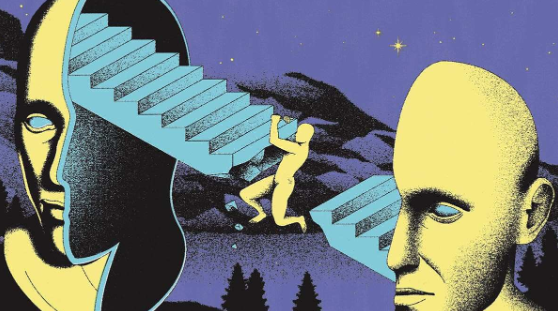Discomfort is ugly. When you do something, which others are not willing to do or put yourself in a difficult situation- like risking it all for the UPSC exam, you will feel the pangs of uncertainty and self-doubt.
Our relationship with trouble is double-edged. We can’t grow without it, we know we need it but we do not like it when it happens to us.
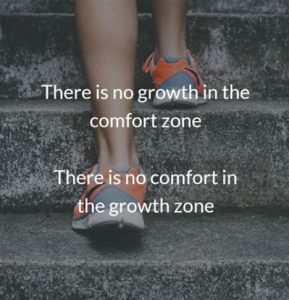
Discomfort is a sign of unbridled chaos, and we are creatures of order. As we seek stability and predictability over our lives and those who we love, we can only ignore, albeit for brief moments, the undeniable and ominous presence of the possibility of utter chaos – a serious illness, loss of a loved one, a failure, an accident, a failed relationship or worse.
Who has time to worry about a collective apocalypse like the one that wiped out the dinosaurs when a personal one is guaranteed for everyone.
What do we do with this information that is enough to make our minds crumble?
Ernest Becker summarized our situation as mortal beings the best- “we are gods who shit”.
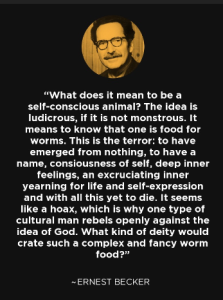
We humans are at once, caught between the mortal shell of the body which disintegrates with every passing moment, and the eternal flight of imagination and ambition that has created every champion, every skyscraper and every achievement a human has ever affected.
How is a mortal creature who is cursed to contemplate its own death, find peace in the brief interlude which we call life? How do we find meaning when everything is determined to end? How should we strive for order when the agents of chaos wait in the shadows always?
Most importantly, why should we actively seek discomfort in the light of the above?
Such existential questions call for answers which are best supplied by existentialist philosophers- Kierkegaard, Nietzsche, Sartre and the like. While they all have dissimilar approaches to seeking the answer, the common thread can be summarized as follows-
Because life is inherently meaningless, it is up to us to create meaning in it by pursuing goals which we find meaningful.

This gives us freedom to decide and to direct our lives, but it also places an equal responsibility on us to take complete ownership of our path.
The actionable and practical import is that when it comes to career choices, we should lead with passion, listen to our inner-voice and NOT just pursue money or social status for the sake of others unless these goals are found to be inherently meaningful.
The trouble is how to determine what is meaningful to us internally and differentiate this with the influence of societal pressures and the expectation of others.
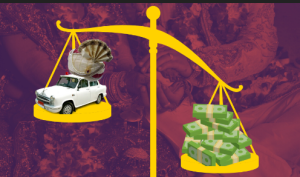
Take for instance the UPSC exam and the craze for government jobs in India. I doubt if the millions of aspiring young Indians are motivated by an internal call of duty. The truth is that most aspirants do not introspect enough to find that which is uniquely meaningful to them.
Finding what is uniquely meaningful is not easy task though. It requires questioning one’s basic assumptions, rebelling against society (perhaps even our parents) and sometimes, following a path which has no precedence or social approval.
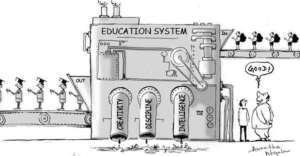
The trouble is compounded by the rigorous uniformity enforced on us by the Education system which seeks to make us compliant automatons instead of fostering creative individuality. The inner voice is easily stifled and rendered inaudible by years of cultural indoctrination.
To listen to it is an act of courage. To embolden is an act of rebellion- not for the meek-hearted. To seek trouble and to swim against the tide of adversity is an act of heroism. To seek discomfort and growth in the face of impending doom is the greatest victory available to humans.
The spirit of rebellion echoes loud in Dylan Thomas’s poem Do not go gentle into that good night-
Do not go gentle into that good night, Old age should burn and rave at close of day; Rage, rage against the dying of the light. Though wise men at their end know dark is right, Because their words had forked no lightning they Do not go gentle into that good night. Good men, the last wave by, crying how bright Their frail deeds might have danced in a green bay, Rage, rage against the dying of the light. Wild men who caught and sang the sun in flight, And learn, too late, they grieved it on its way, Do not go gentle into that good night. Grave men, near death, who see with blinding sight Blind eyes could blaze like meteors and be gay, Rage, rage against the dying of the light. And you, my father, there on the sad height, Curse, bless, me now with your fierce tears, I pray. Do not go gentle into that good night. Rage, rage against the dying of the light.
Our relationship with trouble is troubled but it is the only good fight there is.
So, rage, rage against the dying of the light.
For yours is the only light there is.
– Ravi Kapoor
